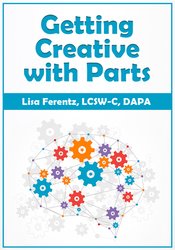

It’s important to honour all of your client’s inner parts in therapy. But accessing them to fully engage in healing work isn’t always easy.
In this workshop recording, we’ll consider key concepts from Internal Family Systems and inner-child work, and explore expressive modalities that vividly bring out parts holding onto influential thoughts, feelings, memories, and somatic experiences.
| File type | File name | Number of pages | |
|---|---|---|---|
| Manual - Getting Creative with Parts (384.4 KB) | 18 Pages | Available after Purchase |

Lisa Ferentz, LCSW-C, DAPA, is a recognized expert in the strengths-based, de-pathologized treatment of trauma and has been in private practice for over 40 years. She has been an adjunct faculty member at several universities, and is the founder of The Ferentz Institute, now in its seventeenth year of providing continuing education to mental health professionals and graduating several thousand clinicians from her two certificate programs in advanced trauma treatment. In 2009 she was voted the “Social Worker of the Year” by the Maryland Society for Clinical Social Work. She is the author of Treating Self-Destructive Behaviors in Trauma Survivors: A Clinician’s Guide, now in its second edition, Letting Go of Self-Destructive Behaviors: A Workbook of Hope and Healing and Finding Your Ruby Slippers: Transformative Life Lessons from the Therapist’s Couch.
Speaker Disclosures:
Financial: Lisa Ferentz maintains a private practice and is the founder and president of the Ferentz Institute. She receives royalties as a published author and is a consultant for Northwest Hospital. Lisa Ferentz receives a speaking honorarium and product royalties from Psychotherapy Networker and PESI, Inc. She has no relevant financial relationships with ineligible organizations.
Non-financial: Lisa Ferentz is a member of the National Association of Social Workers and the American Psychotherapy Association.
Please wait ...